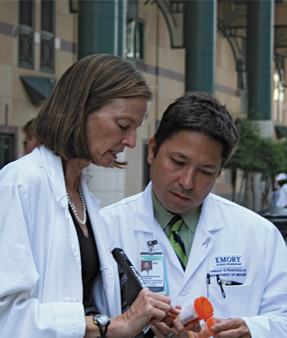Use caution when seeking medical information online
Researching medical knowledge online involves knowing three different types of resources, summary sites, society sites and primary literature. Knowing when to use each ensures the physician makes the correct diagnosis, and preserves the patient's confidence.
Wikipedia, the popular online encyclopedia, is a good resource for finding general information, according to Peter A. Lipson, ACP Member. “It's great if you want to know the GDP of Lichtenstein,” he quipped. But for medical topics, Wikipedia and similar online resources are usually best avoided, he and other experts said.
Quick access to electronic information can be a big help to busy physicians and harried medical students alike, but both groups need to be very careful about what Internet resources they choose to consult.

In particular, experts advise caution with open-access sites. Although Wikipedia, for example, is free and easy to navigate, the content is not peer reviewed and is not necessarily current. Another popular site, Google, is a great for helping to locate a specialty society's recommendations for managing a condition, for example. But results from a standard Google search shouldn't be considered the last word on a topic.
“If you use Wikipedia at all, use it only as a stepping stone to help you find other resources,” advised Diane Altkorn, FACP, associate professor of medicine at the University of Chicago, who teaches residents how to apply evidence-based medicine. “The accuracy of its information is very inconsistent.”
In addition, such unverified sources do not always incorporate the subtleties of clinical decision making, said Vineet Arora, FACP, associate director of the internal medicine residency program at the University of Chicago.
“It may not apply to your patient's specific situation,” said Dr. Arora, who focuses on medical education, quality improvement and patient safety in her work.
Dr. Lipson, a hospitalist in Southfield, Mich., finds it “frightening” that some physicians turn to Wikipedia when making clinical decisions.
“In medicine, so much works on consensus, and I am not sure such sites get updated as the consensus changes. Much better online resources are available,” said Dr. Lipson, who blogs about medical issues at WhiteCoatUnderground.com and ScienceBasedMedicine.org.
Training is crucial
All agree that proper use of electronic resources is an important skill that needs to be taught in medical schools and residency programs, as there is no retreating from Internet usage for the next generation of physicians, which grew up with computers.
“In residency training today, we are being asked to enhance supervision,” Dr. Arora said. “However, many residents may go online for answers before consulting with an attending because they want to appear prepared and knowledgeable. While we do want to encourage a culture of individual inquiry, we need to make sure the sources they are going to are validated.”
As part of Dr. Altkorn's work teaching evidence-based medicine, she asks residents to formulate a clinical question and then look for answers on Google, PubMed or a summary resource such as UpToDate.com. They then present their findings and compare results.
In general, she said, residents find Google is fast and can provide very good resources in its first few tries. But they also find a lot of random, irrelevant information, especially about pharmaceuticals.
The residents generally find that searching PubMed is time-consuming and that the site requires practice to use well, but it can help a person become an expert on a topic, although expertise is not always necessary, Dr. Altkorn said.
Summary resource sites generally yield results quickly, providing relevant citations that otherwise might require a more extensive Internet search to obtain, but the residents often find that summary sites are not always current.
Dr. Altkorn suggests that when residents make decisions about what resources to use, they first define their goals and determine how much time they have.
“If you are in clinic and need an answer now, a summary resource is best. If you have more time, look further, such as society websites,” she said. “To become an expert, read primary literature.”
Ease of access an issue
Dr. Altkorn said that students often access information over their mobile devices and therefore highly value ease of access. Having to sign in to one, or sometimes two, portals discourages them from returning to a site. So does having to buy a subscription.
“So Google or Wikipedia become more appealing to them,” she said. “Of course, this is funny when you compare it to having to go to the library to look things up on paper in the past.”
The experts cited several sites that are better options for electronic information than Wikipedia or Google.
Dr. Altkorn said she typically looks to Medline (the National Library of Medicine's database), the U.S. Preventive Services Task Force and UpToDate.com, as well as subspecialty society sites. UpToDate incorporates the opinions of more than 4,000 clinicians, but charges a subscription fee. Fees can deter users, but often result in better quality information, she said. She noted, however, that PubMed is very valuable and is free.
Dr. Lipson pointed to WebMD.com and MDConsult.com, another subscription-based site, as good sources for general medical information. He said Scholar.Google.com is a valuable search engine because it limits findings to scholarly literature from many disciplines.
For pharmaceutical data, he suggested ePocrates.com, which offers a mix of paid and free content. EPocrates.com states that more than 45% of U.S. physicians use it.
“It is very downloadable and reliable,” Dr. Lipson said.
He also named several free sites that offer reliable information but may not encompass all areas in which a physician might be interested because they are more geared to the public. These include emedicine.com and Cleveland Clinic's disease management site.
Hospital systems can play a big quality assurance role here by making sure the staff has access to the best resources, at work as well as on mobile devices, including institutional subscriptions to appropriate sites, Dr. Arora said.
“People don't stop thinking about their patients when they leave work,” she said. “We need to make sure they have good information at their fingertips at all times.”
Electronic future
Dr. Altkorn noted that access to electronic information is almost transparent in offices that use electronic health records (EHRs), as a computer is already in use in the exam room. Some older physicians resist EHRs, but they are definitely the way of the future, she said. And EHRs may eventually contain the information doctors now turn to the Internet to find, according to Dr. Arora.
“It will become one-stop shopping,” she said. “EHRs will not just be a repository of patient information but a valuable source of decision support.”
However, Dr. Lipson said that while EHRs are helpful, their value in providing some information, such as ICD-9 codes, varies widely as some systems are difficult to search and do not use synonyms well. He has just moved into a new office that does not have an EHR, making alternative sources of code listings all the more important. Here, he sometimes turns to Wikipedia.
“[ICD-9 codes] can be hard to find anywhere else and Wikipedia offers a quick way to access them,” he said.
The experts agreed that there's no retreating from electronic information usage.
“Today's students are very comfortable working with technology and they are going to push us all forward. We need to be sure we are all prepared to handle it correctly,” Dr. Lipson said.





